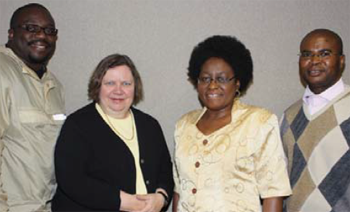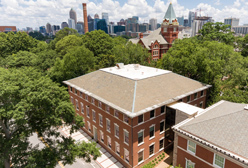New Sponsored Research
Michael Best, Associate Professor in the Sam Nunn School of International Affairs, has received $48,000 from The Carter Center for The Carter Center Democracy Program Collaboration.
What Does Georgia Tech Think?
Selected Press for Ivan Allen College of Liberal Arts
|
January 12, 2012 - January 14, 2014
3:00 pm
January 17, 2012
11:00 am
|
Global Health Innovator William H. Foege to Receive Ivan Allen Jr. Prize for Social Courage
The Georgia Institute of Technology has named William H. Foege as the recipient of the Ivan Allen Jr. Prize for Social Courage. A transformational leader in global health policies who made possible the eradication of smallpox and other diseases worldwide, Foege will be honored during the Ivan Allen College of Liberal Arts Founder's Day events March 14-15, 2012.
“Dr. Foege’s ability to develop and implement innovative health strategies has alleviated much human suffering in our world today and for generations to come,” said Georgia Tech President G. P. “Bud” Peterson. “It is our privilege to honor Dr. Foege for his deep moral commitment to humanitarian progress and his lifetime of service through Georgia Tech’s Ivan Allen Prize for Social Courage.”
During a career spanning 60 years, Foege championed domestic and international health policies emphasizing disease eradication and control, and issues of child survival and development, injury prevention, population control, preventive medicine, and public health leadership, particularly in the developing world. Through leadership roles at the U.S. Centers for Disease Control and Prevention (CDC), The Carter Center and the Task Force for Child Survival, Foege guided early response to the HIV/AIDS crisis; oversaw the eradication of Guinea worm disease, polio and measles, and the elimination of river blindness overseas; and advocated policies that vastly accelerated childhood immunization in developing countries. He is also credited with bringing to life visions for global health at both The Carter Center and the Bill and Melinda Gates Foundation.
The Ivan Allen Jr. Prize for Social Courage recognizes individuals such as Foege who, by standing up for clear moral principles in the social arena, have positively affected public discourse at the risk of their own careers, livelihoods and even their lives. The Prize is supported in perpetuity through a commitment by the Wilbur and Hilda Glenn Family Foundation.
“Like former Atlanta Mayor Ivan Allen Jr., Dr. Foege has envisioned a better world and created communities for realizing that dream in the face of seemingly insurmountable problems,” said Jacqueline J. Royster, dean of the Georgia Tech Ivan Allen College of Liberal Arts. “His courage to do the right thing and his steadfastness, sometimes in the face of staunch opposition, has saved millions of lives and reshaped the global dialog about what is possible in health and social progress.”
As a young epidemiologist working in Nigeria in the 1960s, Foege discovered the power of the surveillance/containment vaccination strategy for eradicating smallpox. He braved civil war there to ensure that the last pocket of the disease was eliminated. Elsewhere in Africa and India, he overcame resistance to the new vaccination strategy, ultimately enabling the world to rid itself of this devastating disease.
Appointed by President Jimmy Carter in 1977 to head the CDC, Foege enlarged the organization’s mandate beyond infectious diseases to encompass the full spectrum of human health. In 1984, Foege co-founded the Task Force for Child Survival and Development as a working group for the World Health Organization, UNICEF, The World Bank, the United Nations Development Program and the Rockefeller Foundation. The forerunner of today’s Task Force for Global Health, the Task Force under Foege increased childhood immunizations worldwide from 20 percent to 80 percent, and expanded its mandate in 1991 to engage challenges such as malnutrition and hunger.
Foege remains active in many organizations. He is on the Advisory Board for the Emory University Global Health Institute and is a professor emeritus, at Emory’s Rollins School of Public Health. He attended Pacific Lutheran University, earned a medical degree from the University of Washington and a Master of Public Health from Harvard University.
More information on the Allen Prize can be found at the following link: http://www.ivanallenprize.gatech.edu/home/
http://www.foundersday.iac.gatech.edu
|
Survey Reveals Scientists Have Trouble Accessing Human Embryonic Stem Cell Lines
The promise of stem cell research for drug discovery and cell-based therapies depends on the ability of scientists to acquire stem cell lines for their research.
A survey of more than 200 human embryonic stem cell researchers in the United States found that nearly four in ten researchers have faced excessive delay in acquiring a human embryonic stem cell line and that more than one-quarter were unable to acquire a line they wanted to study.
"The survey results provide empirical data to support previously anecdotal concerns that delays in acquiring or an inability to acquire certain human embryonic stem cell lines may be hindering stem cell science in the United States," said Aaron Levine, an assistant professor in the School of Public Policy in the Ivan Allen College of Liberal Arts at the Georgia Institute of Technology.
Results of the survey were published in the December issue of the journal Nature Biotechnology. Funding for the study was provided by the Kauffman Foundation's Roadmap for an Entrepreneurial Economy Program.
Levine administered the web-based survey in November 2010 to more than 1,400 stem cell scientists working at U.S. academic and non-profit medical research institutions. Almost 400 respondents from 32 states completed the survey. Of those, 205 respondents reported using human embryonic stem cells in their research, and their responses were used in this study.
The surveyed scientists cited four main reasons for their problems accessing human embryonic stem cell lines: difficulty obtaining material transfer agreements, failure to acquire research approval from internal institutional oversight committees, cell line owners that were unwilling to share and federal policy considerations.
"Bureaucratic challenges may be inevitable in this ethically contentious and politically sensitive field, but policymakers should attempt to mitigate these issues by doing things like encouraging institutions to accept third-party ownership verification and providing clearer guidance on human embryonic stem cell research not eligible for federal funding," said Levine, who is also a member of the Georgia Tech Institute for Bioengineering and Bioscience.
The broad patents assigned to the initial inventors of the method used to isolate embryonic stem cells and numerous narrower patents claiming specific human embryonic stem cell-related techniques are also factors complicating access to human embryonic stem cell lines, according to Levine.
When survey respondents were asked how many of the more than 1,000 existing human embryonic stem cell lines they used, 76 percent reported using three or fewer lines and 54 percent reported using two or fewer lines in their research. More than half of the 130 respondents cited access issues as a major reason they chose to use specific cell lines in their research.
"These results illustrate that many human embryonic stem cell scientists in the United States are not conducting comparative studies with a diverse set of human embryonic stem cell lines, which raises concern that at least some results are cell-line specific rather than broadly applicable," said Levine. "Federal and state funding agencies may want to consider encouraging research using multiple diverse human embryonic stem cell lines to improve the reliability of research results."
Embryonic stem cell lines are being used to develop new cellular therapies for various diseases, to screen for new drugs and to better understand inherited diseases. It's crucial that diverse lines are available for this research to ensure that all individuals benefit from the results.
While availability was cited as the most common factor affecting scientists' choices regarding which cell lines to use, other considerations included suitability for a specific project, familiarity with specific lines, a desire to reduce complications in the laboratory, cost, the extent of relevant literature and the preferences of scientists' colleagues.
Three of the initial human embryonic stem cell lines derived at the University of Wisconsin in the late 1990s were the lines most commonly used by respondents. Cell lines H1, H9 and H7 were used by 79, 68 and 26 percent of respondents, respectively. Scientists also reported using more than 100 other lines, but each of these was used by fewer than 12 percent of respondents.
"Other research communities in the life sciences have experienced material access problems and they addressed them, in part, by creating centralized information and data sharing hubs, including public DNA sequence databases, tissue banks and mouse repositories. The stem cell research community has taken promising steps in this direction, but this analysis should encourage the community to continue and, if possible, accelerate these efforts," added Levine.
Written by Abby Robinson, Research News & Publications Office
Related Links
|
Brown Study Debunks Six Myths About Electricity in the South
|
|
Clean
energy can help meet growing electricity demand and minimize pollution in the southern
United States, but progress to adopt renewable energy strategies has been
hindered by a number of myths, according to a new study by Georgia Tech and
Duke University researchers.
The
study, published in the journal Energy Policy, debunks popular myths
about clean energy that have been promulgated by policymakers, business leaders
and advocacy groups in the South. Those
myths – encompassing both sides of the clean energy debate – may affect how
the South responds to what is expected to be a 28 percent rise in population
within the next 20 years.
“The
South has an abundance of sustainable energy technologies and resources, but
misperceptions about their availability and readiness result in support for
conventional energy systems,” said Marilyn Brown, co-author and professor in
Georgia Tech’s School of Public Policy. “Our research is motivated by the hope
that promoting fact-informed dialogue can tackle such barriers and clear the
way for a more sustainable energy future.”
Using
an energy-economic modeling tool, researchers analyzed the following six myths,
identified through their earlier research on energy in the South:
- Energy efficiency and renewable energy by themselves
cannot meet the South’s growing electricity demand;
- The South does not have sufficient renewable energy
resources to meet a Federal Renewable Energy Standard;
- Renewable energy cannot be promoted without escalating
electricity rates;
- Energy efficiency and renewable energy policies are not
compatible;
- Cost-effective energy efficiency and renewable energy
policies are sufficient to retire existing coal plants and reduce air
pollution;
- Power resource decisions have little impact on water
resources.
The
researchers found that energy efficiency and renewable energy can work together
to meet projected growth without escalating electricity rates. The study also indicates
that implementing renewable electricity standards and other complementary
policies could stabilize greenhouse gas emissions. Coupling these policies with
stronger regulations, such as a $15 per ton carbon tax, could help retire
coal-fired power plants and reduce emissions by 23 percent compared to today’s
levels. The researchers also found that while energy impact on water usage is
largely ignored, renewable and efficient options could hold water-saving
benefits—up to one trillion liters in 2030—for this drought-prone region.
“Myths
about clean electricity shape perceptions and have delayed progress in the
South,” said Etan Gumerman, the study’s co-author and senior policy analyst at
Duke’s Nicholas Institute for Environmental Policy Solutions. “We hope that by
casting doubt on these myths, we can begin a productive discussion about
affordable clean electricity and how it could shape public policies.”
To
review the paper, “Myths and Facts about Electricity in the U.S. South,”
visit http://www.nicholasinstitute.duke.edu/myths-and-facts-about-electricity-in-the-u.s.-south. |
Birchfield Honored by French Government
|
|
Vicki L. Birchfield has been awarded the distinction of “Chevalier de l’Ordre Nationale du Merite” (Knight in the French National Order of Merit) by decree of the President of the French Republic on October 12, 2011. The award is one of highest civilian honors accorded by the French government. Birchfield, Associate Professor in the Sam Nunn School of International Affairs in the Georgia Tech Ivan Allen College of Liberal Arts, was recognized for her “brilliant leadership in service of the transatlantic relationship.” Serving on the Georgia Tech faculty since 2000, Birchfield has led a study abroad program in Europe taking hundreds of students to study the European Union and transatlantic relations from the capitols of Brussels, Paris, and Berlin. She directed the European Union Center of Excellence at Georgia Tech from 2008 to 2011. Currently, she co-directs the Center for European and Transatlantic Studies whose mission is to advance knowledge and understanding of the E.U., transformations in European politics and society, and the significance of the E.U.-U.S. relationship. Her research and teaching has also focused on French political economy and culture and she has been a visiting scholar at Sciences Po, Paris and the University of Bordeaux. Birchfield will be presented the medal during an official ceremony at a future date. |
Pearson Among Distinguished Members Honored by Scientific Research Society
|
|
Willie Pearson, Professor of Sociology in the Ivan Allen College of Liberal Arts School of History, Technology, and Society (HTS) was one of those honored recently by Sigma Xi, the international Scientific Research Society, during its 125th anniversary. A 20-year member of Sigma Xi, Pearson and other distinguished members of the Society were celebrated for their contributions to science. Pearson specializes in the sociology of science and the sociology of the family. He has served as a lecturer in Sigma Xi's Distinguished Lectureship Program; chaired the Committee on Equal Opportunities in Science and Engineering (CEOSE) of the Executive Office of the National Science Foundation; and chaired the Committee for Science, Engineering, and Public Policy of the American Association for the Advancement of Science (AAAS). In 2001, he was designated a lifetime National Associate of the National Academies. Currently, he serves on advisory committees in the Education and Human Resources Directorate (National Science Foundation), the Burroughs Wellcome Fund, and the National Academy of Sciences. |
Knox-Hayes Receives Abe Fellowship to Study Environmental Finance in Asia
|
|
School of Public Policy Assistant Professor Janelle Knox-Hayes has been awarded an Abe Fellowship for the year 2012. Abe Fellowships are designed to encourage international multidisciplinary research on long-range global concerns in policy-relevant topics. Knox-Hayes will use the fellowship to investigate the initiation and evolution of environmental finance in Asia, environmental finance being the mechanism of converting ecological services and resources into financial instruments that can be traded and sold to establish a market price. She will interview market makers in organizations such as banks, brokerages, government agencies, legal firms, and exchanges. “Environmental finance in Asia is interesting,” said Knox-Hayes, “because we do not yet understand the movement of economic and financial traditions into different varieties of capitalism or the initiation of new financial institutions designed to colonize the natural environment as a source of new financial instrumentation.” As an Abe Fellow, Knox-Hayes will become a member of a key bilateral and global research network built around such topics. |

|
Georgia Tech is Collaborating with South Africa on Measuring Science, Technology, and Innovation
Susan Cozzens, Associate Dean for Research and Professor of Public Policy, has been working with South Africa’s Human Sciences Research Council (HSRC) on measuring science, technology, and innovation.
Cozzens met with HSRC leadership and researchers in South Africa this fall as a follow-up to HRSC CEO Olive Shisana’s visit to Georgia Tech in November 2010 to explore possible collaborations.
The 2011 meeting focused on areas of common interest between Georgia Tech and the HRSC such as measuring and developing science, technology, and innovation indicators. Discussions included innovation in the informal sector (businesses that operate outside government regulation); the need to benchmark and develop policy briefs on the impact of R&D and innovation surveys on the knowledge-based economy; and the role of women in science and technology. Projects are also being developed on factors that contribute to effective public service delivery in cities.
Cozzens was in South Africa in connection with her research on nanotechnology in society, and is pursuing collaborative work with HSRC researchers on the impacts in the South African economy of nanotechnology applications in water, energy, and agrifood.
|
Fred Rossini, Influential Former Liberal Arts Faculty Member, Passes Away
Frederick Anthony Rossini, a Georgia Tech faculty member in social sciences during the 1970s and 1980s, passed away November 15 in Athens, Georgia.
A leading force in the College of Sciences and Liberal Arts (COSALS), the forerunner to today's Ivan Allen College of Liberal Arts, Rossini was among those who advocated a focus on science and technology policy for liberal arts at Georgia Tech. He played a key role in establishing the Technology and Science Policy (TASP) Master's Program, which evolved into today's public policy degrees.
The son of Frederick D. Rossini, one of the preeminent thermodynamicists of the twentieth century, Rossini's research interest was technology forecasting, assessment, and management. During his years on faculty at Georgia Tech, he served as director of the Technology, Policy, and Assessment Center (TPAC). He worked with Tom Stelson, Vice-President for Research at Georgia Tech, then moved to George Mason University as Vice-Provost and then Provost. He was a co-founder of the International Association for Impact Assessment.
A memorial service for Dr. Rossini was held in Athens on December 10. In lieu of flowers, contributions in Dr. Rossini's name may be made to The Fund for Southern Communities or Citizen Advocacy Athens-Clarke.
Read Obituary for Dr. Rossini
|
Brittain Fellows Shine
Brittain Postdoctoral Fellow Makes Bestseller List
 Second-year Brittain Postdoctoral Fellow Dr. Andy Frazee’s first book of poetry, The Body, The Rooms, ranked #17 on Small Press Distribution’s (SPD) poetry bestseller list for October. Second-year Brittain Postdoctoral Fellow Dr. Andy Frazee’s first book of poetry, The Body, The Rooms, ranked #17 on Small Press Distribution’s (SPD) poetry bestseller list for October.
Founded in 1969, SPD is currently the only distributor in the country dedicated exclusively to independently published literature, serving over 400 small and independent presses. As such, it stands as one of the most respected and important distributors of poetry in the US.
Brittain Fellow Composes 'Verbal Score' for Artist's Film at MOCA GA
 John Harkey, a first-year Brittain Fellow in Georgia Tech's Writing and Communication Program, recently collaborated with artist and filmmaker Micah Stansell, whose work "The Water and the Blood" is currently on display at the Museum of Contemporary Art, Georgia (MOCA GA). John Harkey, a first-year Brittain Fellow in Georgia Tech's Writing and Communication Program, recently collaborated with artist and filmmaker Micah Stansell, whose work "The Water and the Blood" is currently on display at the Museum of Contemporary Art, Georgia (MOCA GA).
Drawing equally from his own and from others' writings, Harkey composed a voice-over script for Stansell's 20-minute film which is an immersive cinematic installation. Eight separate but synchronized projections, each one 10-feet high, seamlessly surround visitors on three walls. Harkey's collage of language, read by Michael Adare, is keyed to the work's array of episodes, providing a "verbal score" for the kaleidoscopic film (the only audio in the room itself is a dreamy ambient score; to hear Harkey's voice-over, visitors put on a pair of wireless headphones that are provided at the gallery's entrance). Read Jerry Cullum's review of the work in "Arts Critic Atl".
The Marion L. Brittain Postdoctoral Fellows are instructors in the Writing and Communication Program within the School of Literature, Communication, and Culture.
|
Computational Media Student Wins Honors for GT Cable Network
|
|
The work of Computational Media major, Austin Gasaway, garnered five Pixie Awards for the Georgia Tech Cable Network (GTCN). Sponsored by the American Pixel Academy (APA), a coalition of professionals and educators in the field of electronic moving pixels, the Pixie Awards honor outstanding work in animation, effects, and motion graphics in the U.S. and Canada. Gasaway is a student assistant at GTCN and worked under the direction of GTCN's Scott Sergent on projects ranging from visual effects to motion graphics to opening titles. “I plan to pursue motion graphic design as a career," said Gasaway. "After graduation I want to go freelance and design graphics for various companies around the world. I sometimes think about the work I do at GTCN as practice for the real world, but I know it is more than that. As I am working, I am also enhancing my resume, building my portfolio, and most importantly, having fun." Some of the award-winning work appears in the student-produced TV series, “Kings of the Court.” Computational Media is a joint major in the IAC School of Literature, Communication, and Culture and the College of Computing. www.pixieawards.com Visit http://lcc.gatech.edu/compumedia/ |
|

